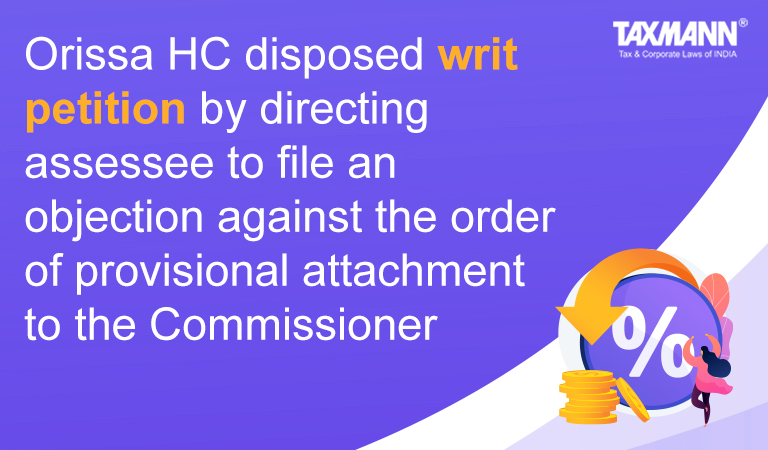Orissa HC disposed writ petition by directing assessee to file an objection against the order of provisional attachment to the Commissioner
- Blog|News|GST & Customs|
- 2 Min Read
- By Taxmann
- |
- Last Updated on 12 October, 2021

Case Details: Shri Radha Raman Alloys (P.) Ltd. v. Union of India - [2021] 130 taxmann.com 500 (Orissa)
Judicial and Counsel Details
-
- Dr. S. Muralidhar, CJ and S.K. Panigrahi, J.
- B. Nayak, Adv. for the Petitioner.
- Ch. S. Mishra, Adv. for the Respondent.
Facts of the Case
The provisional attachment order was issued by the Deputy Director, Directorate General of Goods and Services Tax, Rourkela and over draft bank account of the petitioner was attached under section 83 of the Central GST Act. The petitioner filed writ petition seeking direction to operate the over draft account.
The Honorable High Court observed that Section 83 of the CGST Act, 2017 empowers Commissioner to order the provisional attachment of any property, including a bank account, belonging to the taxable person. The Rule 159 of the CGST Rules, 2017 sets out the procedure to be adopted for issuing a provisional attachment order. Also, the Rule 159(5) provides that a person whose property is attached may, within seven days of such attachment, file an objection to the effect that the property attached was or is not liable to attachment. After such objection is filed, the Commissioner is required to offer the person objecting an opportunity of being heard and thereafter pass an appropriate order in FORM GST DRC-23, if he is of the view that the property is required to be released from attachment.
High Court Held
In the present case, the petitioner approached this Court without availing the aforementioned remedy available to it in law. Therefore, the Court directed the petitioner to file an objection to order of provisional attachment of its bank account and the Commissioner shall proceed to fix a date for hearing the petitioner and petition was disposed off.
Disclaimer: The content/information published on the website is only for general information of the user and shall not be construed as legal advice. While the Taxmann has exercised reasonable efforts to ensure the veracity of information/content published, Taxmann shall be under no liability in any manner whatsoever for incorrect information, if any.

Taxmann Publications has a dedicated in-house Research & Editorial Team. This team consists of a team of Chartered Accountants, Company Secretaries, and Lawyers. This team works under the guidance and supervision of editor-in-chief Mr Rakesh Bhargava.
The Research and Editorial Team is responsible for developing reliable and accurate content for the readers. The team follows the six-sigma approach to achieve the benchmark of zero error in its publications and research platforms. The team ensures that the following publication guidelines are thoroughly followed while developing the content:
- The statutory material is obtained only from the authorized and reliable sources
- All the latest developments in the judicial and legislative fields are covered
- Prepare the analytical write-ups on current, controversial, and important issues to help the readers to understand the concept and its implications
- Every content published by Taxmann is complete, accurate and lucid
- All evidence-based statements are supported with proper reference to Section, Circular No., Notification No. or citations
- The golden rules of grammar, style and consistency are thoroughly followed
- Font and size that’s easy to read and remain consistent across all imprint and digital publications are applied



 CA | CS | CMA
CA | CS | CMA
